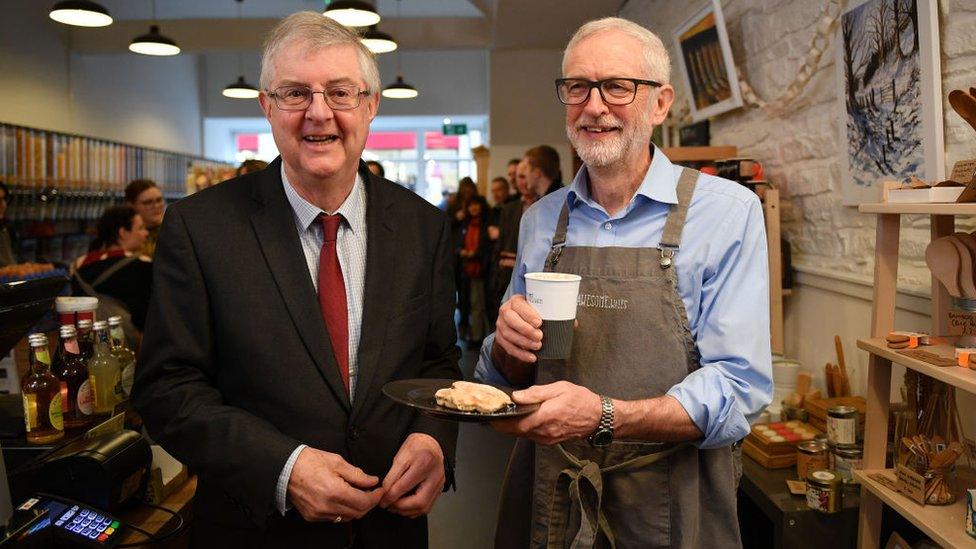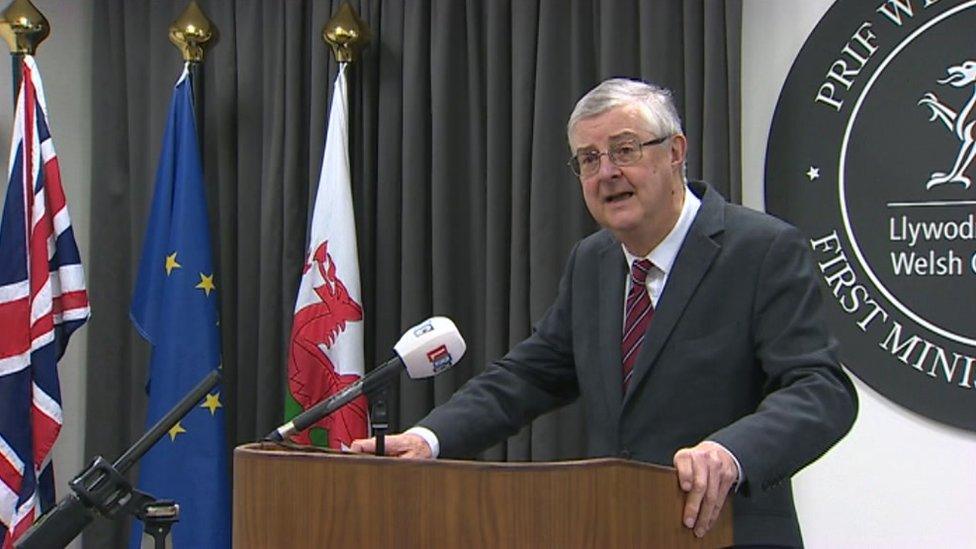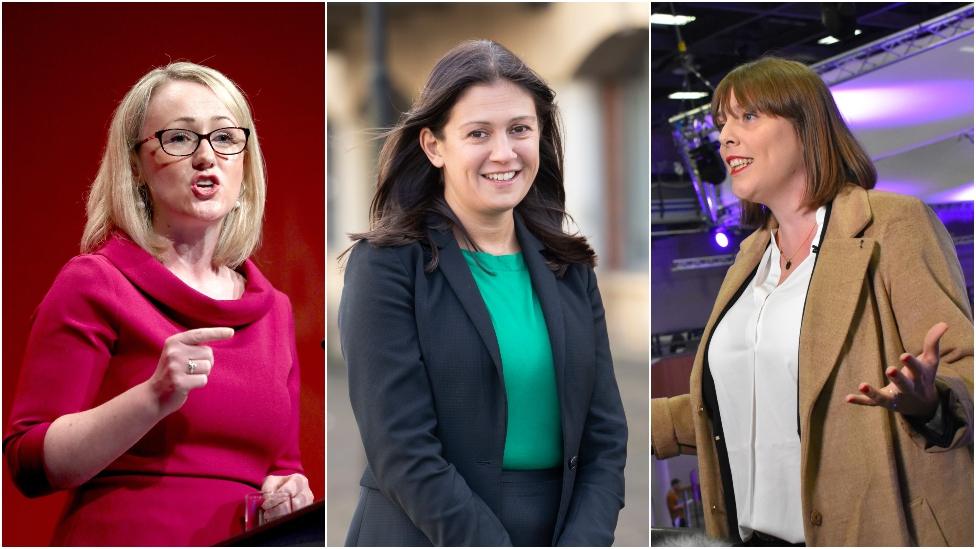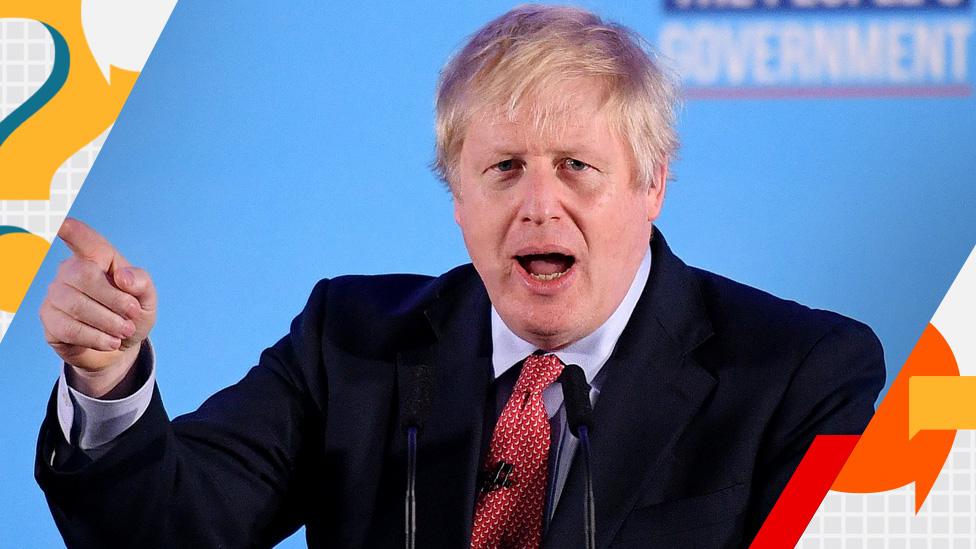First minister 'complacent' over election result, AMs say
- Published

Mark Drakeford and Jeremy Corbyn campaigned together in Barry during the general election campaign
First minister Mark Drakeford has been accused by Labour assembly members of being "complacent" and in "denial" about the party's election result.
Several have told BBC Wales they were unhappy with Mr Drakeford's analysis of Labour's general election defeat at Tuesday's Labour group meeting in the Senedd.
Labour had its worst UK performance since 1935.
But despite losing six seats it remained the biggest party in Wales.
A senior Welsh Labour source said there had been a "robust discussion".
"It was the kind of discussion we should be having within the group and the confidentiality of the group, and it's really important that this discussion has been held," the source added.
After the election Mr Drakeford said he did not believe Labour leader Jeremy Corbyn's project was discredited and the party should stick with the "basic message" Labour "stands for something better".
In a press conference on Monday, Mr Drakeford said: "We need a leader who will regard the manifestos of 2017 and 2019 as scripts to be developed, not abandoned."

Labour AMs have criticised Mark Drakeford's assessment of the party's general election performance
BBC Wales has been told by several AMs that on Tuesday - the first Labour group meeting since the election - there was widespread criticism of the Mr Drakeford's election reaction.
One AM present said the first minister was "very complacent" about Labour's performance in Wales and "very defensive" about the manifesto.
They added: "If we can't recognise what we have done wrong how can we put it right?"
One member is said to have shouted "tell that to David Hanson" in response to the Welsh Labour leader defending Labour's vote share in Wales.
Mr Hanson had held the Delyn seat since 1992 before losing it to the Conservatives in December.
Another AM said: "I certainly think a lot of people, beyond the usual suspects, were frustrated and critical of his analysis.
"Pressing on as we have been is not an option.
"That's exactly the kind of reaction we don't want".
'Public perception of Corbyn'
Another said after an hour-long discussion: "There wasn't a single person around that table who was not wise enough to know that the election defeat we had just suffered was of a considerable magnitude, and was caused by several factors, not just Brexit, and that the public perception of Corbyn was a key issue on the doorstep.
"After a full and frank discussion Mark's summing up did not mention Corbyn at all, nor acknowledge our concerns about the pie in the sky manifesto or anti-Semitism within the party.
"Instead he focused on the fact we should be proud we held 22 seats in Wales and 41% share of the vote."
The AM said members, including some in government, "are incredulous that the FM is in such denial".
"Members from north Wales are particularly angry," they said.
"I think you would struggle to find such levels of denial anywhere within the PLP (Parliamentary Labour Party in Westminster) apart from Rebecca Long Bailey (Labour leadership candidate) and Corbyn himself.
"About a third of the group expressed very strong views against what he had said, and those included members who had backed him in the race for leader, both at backbench and government level."
'Party of hope'
A Drakeford ally present acknowledged a "variety of views" had been put forward by AMs called the discussion "superficial".
Mr Drakeford has said he would not be publicly declaring support for any candidate in Labour's leadership election.
But writing in Friday's Western Mail, external, he outlined the qualities and policies he will look for in Jeremy Corbyn's successor, including retaining "our best ideas from the last two manifestos".
"Many of our policy proposals are supported by a wide swathe of voters," he said.
"The reversal of the decline in our political fortunes will not be found in reversing long-standing - and popular - aspects of the Labour Party.
"The next Labour leader must continue to espouse and refine policies which mark us out as the party of hope."
- Published9 January 2020

- Published13 December 2019

- Published15 December 2019
